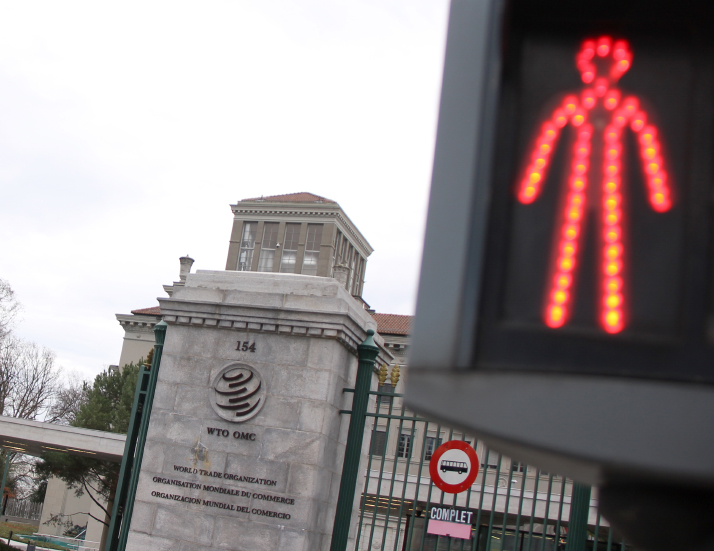| Voice |
| Throwing Away the 'Crown Jewel' | |
| Why the U.S. forced the WTO appellate body to expire | |
|
|
 The WTO headquarters in Geneva, Switzerland, on December 11, 2019 (XINHUA)
 The appellate body of the World Trade Organization (WTO) expired on December 11, 2019, since the member countries could not reach consensus on appointing new judges. Only one judge remained after all others' terms expired, the last two leaving on December 10. It made the trade dispute resolution mechanism defunct as according to WTO rules, appeals have to be heard by three judges. The appellate body of the World Trade Organization (WTO) expired on December 11, 2019, since the member countries could not reach consensus on appointing new judges. Only one judge remained after all others' terms expired, the last two leaving on December 10. It made the trade dispute resolution mechanism defunct as according to WTO rules, appeals have to be heard by three judges.
The United States repeatedly blocked new appointments. At the last minute, it refused to agree to a draft by the WTO General Council to improve the operation of the appellate body. The mechanism that once provided so many solutions to international trade differences has been systematically undermined. Ironically, the WTO, the place to resolve trade disputes, has become a battlefield, facing unprecedented challenges. Role of a safeguard Since its inception in 1995, the dispute settlement mechanism has resolved an impressive number of trade disputes, which earned it the reputation of being the "crown jewel" of the global trading system. The WTO settles disputes between members in this way: A member can request consultations with the member it has a dispute with. If the consultation is not held within 30 days, the member can ask for setting up a panel to hear the dispute. When the panel gives its report, both members can appeal against it to the appellate body, which will then review the report. This makes the appellate body the final stage in the dispute settlement adjudication. The appellate body's review is adopted unless there is a consensus among the WTO members against adopting it. This mechanism ensured the stability, authority and effectiveness of the multilateral trading system. It safeguarded the rules-based international order and was a boon to many developing countries. With the appellate body becoming defunct on December 11, 10 appeals that were being heard have been left in limbo and no new appeal can be accepted. So far, 119 member countries have asked for the revival of the defunct body. The EU, China and other WTO members submitted more than a dozen proposals to reform the organization but they were blocked after the U.S. disagreed with them. The WTO General Council appointed a special coordinator to respond to U.S. concerns but Washington said the proposed reform does not resolve the systemic problems and it would not accept it. Reacting to that, João Aguiar Machado, the EU's WTO Ambassador, said, "The actions of one member will deprive other members of their right to a binding and two-step dispute settlement system even though this right is specifically envisaged in the WTO contract."
WTO Director General Roberto Azevêdo (center) speaks at a press conference after a two-day meeting of the WTO's General Council in Geneva, Switzerland, on December 10, 2019 (XINHUA)
An ax to grind Since the founding of the WTO 25 years ago, international politics and trade structures have undergone profound changes. In particular, China's international influence has expanded, making it a major competitor in the eyes of the U.S. The U.S. has withdrawn from several multilateral mechanisms and shown reluctance to provide public goods to the world. It has also taken unilateral actions on trade policies and tried to reshape the international order, even at the expense of its international image. The WTO was an important platform for the U.S. to maintain its economic and trade hegemony. The U.S. is the main designer of the entire WTO system, including the dispute settlement mechanism. However, in recent years, it began to express concerns over the functioning of the appellate body, saying in the absence of oversight the organ had exceeded its mandate in certain cases, disregarding time limits and other rules for conducting its business. While the U.S. complaint is seemingly aboveboard, in reality it has an ulterior motive. The U.S. has been seeking to muzzle the appellate body after it lost some disputes. By muzzling the agency, it is seeking to continue its trade bullying. According to Cui Fan, a professor at the University of International Business and Economics in Beijing, since the establishment of the WTO, the U.S. has been sued 155 times, making it the member facing the highest number of complaints. The EU comes a distant second with 85 cases. And the U.S. has lost 90 percent of the cases. With the U.S. continuing with its trade protectionism and using the threat of tariffs to reshape trade relations with other countries, there could have been more cases in the future. So for the U.S., the weaker the WTO becomes, the better it is for its plans. The U.S. has been using the appellate body crisis as a bargaining chip to press for a comprehensive reform of the WTO. In March 2019, U.S. Trade Representative Robert Lighthizer told the Senate Committee on Finance that he knew no other way to push for WTO reform than to use the only leverage available to the U.S.: blocking the appointment of appellate body judges. The U.S. has repeatedly raised questions about the deficiencies of the appellate body but never offered any solutions. Descending into chaos As Jennifer Hillman, a former U.S. member of the appellate body, said, an effective WTO dispute settlement mechanism would have a deterrent effect on members who broke WTO rules. But after its expiry, though some trade disputes can still be settled through consultations and panels, the absence of the final appeal unit will affect the efficiency of consultations and the implementation of rulings, thereby impacting the stability and effectiveness of the whole WTO. Consequently, the international trade order might give way to the law of the jungle, where national strength will determine most of the dispute outcomes. Every trade dispute between countries could evolve into a trade war with trade barriers raised and retaliation initiated. This will worsen the sluggish world economy and hit international trade. Other WTO members have not given up trying to restart the appellate body. Many members have begun to discuss establishing a provisional mechanism. The EU has resorted to an interim appeal arbitration procedure and called on more WTO members to join the arrangement. Indonesia and Viet Nam have said they will not contest the panel's decisions in the future. However, both arrangements have not yet been endorsed by a majority of members and the chances of a U.S. compromise seem close to zero. There are also proposals to change the practice of consensus-based decision-making and have a vote to determine how new appellate body judges will be appointed. But this could prompt the U.S. to withdraw from the WTO and without the U.S., the authority and effectiveness of the WTO would be greatly diminished. Also, if the U.S. leaves the WTO, it is likely to go out of control, leading to more chaos in the international trade order. In response to the expiry of the appellate body, the EU has announced that it would toughen its own laws concerning bilateral and regional trade agreements. The proposed legal changes would empower Brussels to impose additional tariffs in situations where a WTO dispute settlement panel ruled in the EU's favor and the losing country then appealed to the appellate body, which became defunct subsequently, or the losing country then resorted to some illegal measure. With this proposal, the EU wants to deal with the potential risks in the case of WTO members refusing to join provisional arrangements for appellate arbitration. All parties well recognize the need for WTO reform. But they also know the task is daunting and cannot be done short term. WTO members need to seek common ground and move forward together. The author is an assistant researcher with the China Institutes of Contemporary International Relations Copyedited by Sudeshna Sarkar Comments to yanwei@bjreview.com |
|
||||||||||||||||||||||||||||
|
